Global Coherence Research
The Science of Interconnectivity
Global coherence research encompasses a large variety of scientific data to gain new insights into the interconnectedness of human/
The Science Behind the Global Coherence Initiative
Scientific Background
The idea that the earth, sun and other planetary bodies influence human health and behavior and, on a larger scale, social unrest and significant global events, has been discussed among scientists for decades. The study of interconnectedness, which is not yet fully embraced in the mainstream scientific community, is still in infancy.
Global coherence research uses a multidisciplinary approach that includes the geosciences and astrophysics as well as extensive data from human and animal studies that are correlated to social and global events. The Global Coherence Initiative (GCI) employs the Global Coherence Monitoring System to collect a variety of data, information about Earth’s magnetic field and how it affects and is influenced by human emotions and behaviors.
Global Coherence Monitoring System
The Global Coherence Monitoring System (GCMS), GCI’s scientific component, uses state-of-the-art sensing technology to observe changes in the earth’s magnetic field. Eventually, there will be about a dozen sensor sites in the GCMS worldwide network of magnetometers. As of 2015, sensor sites were operating around the clock in the following locations:
- Boulder Creek, California
- Hofuf, Saudi Arabia
- Alberta, Canada
- Baisogala, Lithuania
- Northland Region of New Zealand
- Kwazulu Natal, South Africa
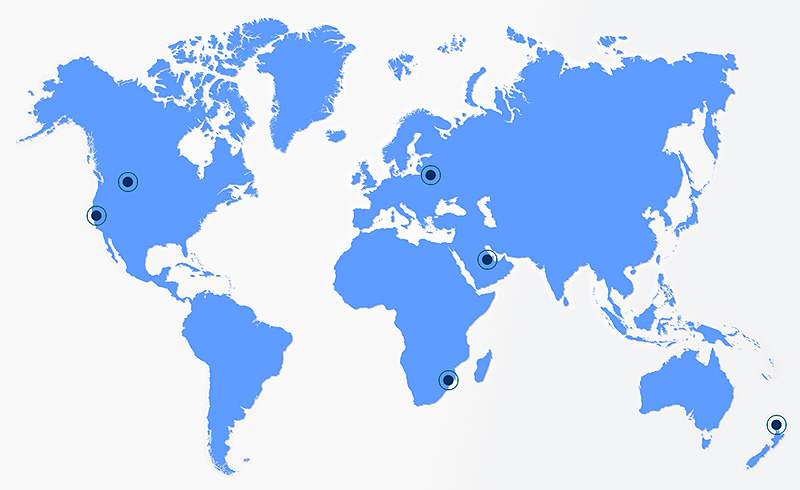

The GCMS sensors continuously monitor the resonant frequencies in Earth’s magnetic field. They track changes in geomagnetic activity caused by solar storms, changes in solar wind speed, disruption of the Schumann resonances (SR) and, potentially, the signatures of major global events that have a strong emotional component.
It is well established that the resonant frequencies in the earth’s various magnetic fields directly overlap with those of the human brain, cardiovascular and autonomic nervous systems. Therefore, it should not be surprising that numerous physiological rhythms in humans and global collective behaviors are not only synchronized with solar and geomagnetic activity, but that disruptions in these fields can create adverse effects on human health and behavior. When the earth’s magnetic field environment is disturbed it can cause sleep disturbance, mental confusion, unusual lack of energy or a feeling of being on edge or overwhelmed for no apparent reason.
We use the Global Coherence Monitoring System to conduct research on the mechanisms of how the earth’s various fields affect human physiological, mental and emotional processes, health and collective behavior. In addition, we hope to investigate whether changes in the earth’s magnetic fields occur before natural catastrophes like earthquakes, volcanic eruptions and human events such as social unrest and terrorist attacks.
Overarching Global Coherence Hypotheses
The following GCI hypotheses guide our ongoing collaborative research:
- Human and animal health, cognitive functions, emotions and behavior are affected by solar, geomagnetic and other earth-related magnetic fields.
- The earth’s magnetic field is a carrier of biologically relevant information that connects all living systems.
- Every person affects the global information field.
- Collective human consciousness affects the global information field. Therefore, large numbers of people creating heart-centered states of care, love and compassion will generate a more coherent field environment that can benefit others and help offset the current planetary discord and incoherence.
Related to all of the above hypotheses is that human emotions and consciousness interact with and encode information into the geomagnetic field and this information is distributed globally. We believe there is a feedback loop between human beings and the earth’s energetic/magnetic systems.
We are suggesting in essence that this encoded information is communicated nonlocally between people at a subconscious level, in effect linking all living systems. Magnetic fields act as carrier waves for this information, which can influence all living systems – positively or negatively – within the field environment as well as our collective consciousness.
The scientific community is beginning to appreciate and understand at the deeper level how we are all interconnected with and affected by the magnetic fields generated by the sun and earth. Every cell in our bodies is bathed in an external and internal environment of fluctuating invisible magnetic forces.
Human physiological rhythms and behaviors are synchronized with solar and geomagnetic activity, so fluctuations in the earth and sun’s magnetic fields can affect virtually every circuit in human as well as any biological systems. Logically, disruptions in these fields could adversely affect human health and behavior. Moreover, changes in the intensity of geomagnetic activity and the Schumann resonances appear to alter brainwave and neurohormonal responses. (The brain is a very sensitive electromagnetic organ.)
Changes in the earth’s magnetic field have been shown to affect human heart rhythms and have been associated with the following: changes in brain and nervous-system activity; athletic performance, memory and other tasks; synthesis of nutrients in plants and algae; the number of reported traffic violations and accidents; mortality from heart attacks and strokes; and incidence of depression and suicide.
The earth and ionosphere generate a symphony of frequencies ranging from 0.01 hertz to 300 hertz, and some of the large resonances occurring in the earth’s field are in the same frequency range as those occurring in the human cardiovascular system, brain and autonomic nervous system. Although researchers have looked at some of the possible interactions between the earth’s field and human, animal and plant activity, new data from GCI research is indicating that we may be more deeply interconnected with the earth’s field than previously imagined.
Historically, many cultures believed their collective behavior could be affected by the sun and other external cycles and influences. This belief has proven to be true. On a larger societal scale, increased violence, crime rate, social unrest, revolutions and frequency of terrorist attacks have been linked to the solar cycle and the resulting disturbances in the geomagnetic field. The first scientific evidence of this was provided by Alexander Tchijevsky, a Russian scientist who noticed that more severe battles in World War I occurred during peak sunspot periods. Tchijevsky then conducted a thorough study of global human history dating back to 1749 and compared the occurrence of key events with the occurrence of solar cycles over the same time period until 1926. The figure below, reconstructed from Tchijevsky’s original data, plots numbers of significant human events corresponding with the occurrence of solar cycles from 1749 to 1926.
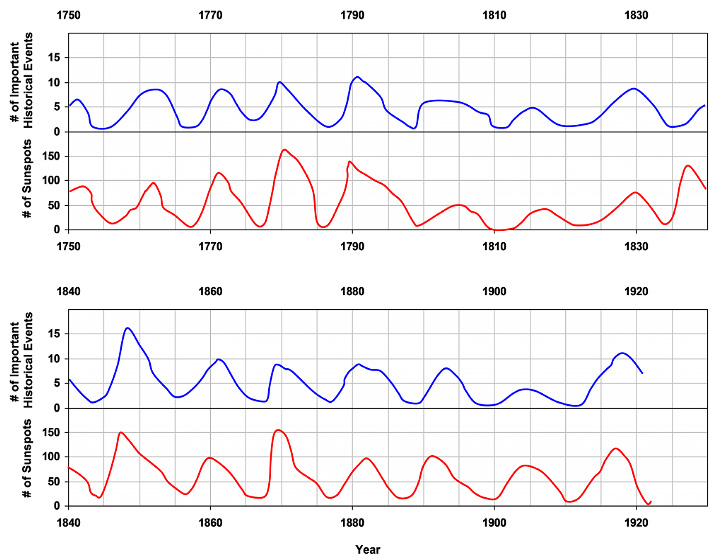
Tchijevsky’s original data: The blue line plots the annual number of important political and social events such as the start of wars, social revolutions, etc., while the red line plots solar activity as indicated by the number of sunspots from 1749 to 1922. The histories of 72 countries were compiled, and it was found that 80% of the most significant events occurred during solar maximums, which correlate with the highest periods of geomagnetic activity.
Solar activity has not only been associated with social unrest. It also has been related to the periods of greatest human flourishing, with definitive spurts in architecture, arts and science and positive social change.
We can learn from past mistakes and consciously choose new ways of navigating these great energy influxes to create periods of human flourishing and humanitarian advances. When outdated structures that do not serve humanity collapse, an opportunity opens for them to be replaced with more suitable and sustainable models. Such positive change can affect political, economic, medical and educational systems as well as people’s relationships in their workplaces, homes and communities.
Earth Rhythms
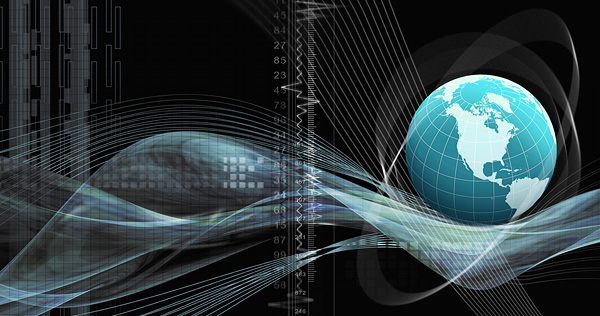
Earth has a strong internal magnetic field that appears to be generated by electrical currents in the liquid outer iron core that are driven by internal heat sources.
The magnetic field resembles that of a bar magnet or "dipole field" with an axis tilted about 11.5 degrees from the spin axis, so, the magnetic poles are not the same as the geographic poles. Earth’s magnetic field strength was first measured by Carl Friedrich Gauss in 1835 and has been measured repeatedly since then. The field has shown a relative decay of about 10% over the last 150 years. The locations of the magnetic poles are not static; they wander as much as 55 kilometers every year.
The geomagnetic field is influenced by the sun and moon’s rotations, solar flares and probably interplanetary influences. Animals, including birds, can detect Earth’s magnetic field and use it to navigate during migration. It has been shown, for example, that cows and deer, when grazing, tend to align their bodies north-south in response to the earth’s magnetic field.
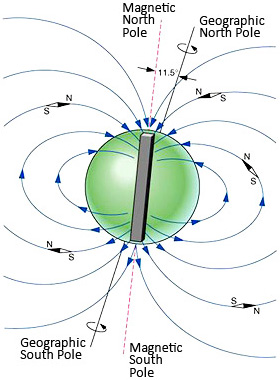
The forces of the solar wind include charged particles that push against Earth’s magnetic field.
Because of the solar wind, the portion of the geomagnetic field facing the sun is pushed in toward the earth’s surface and flattened when the portion of the field facing away from the sun, known as the magnetotail, is pulled away from Earth (see figure below). A visible phenomenon of the collision of charged solar particles with Earth’s magnetic field is auroras, or the northern and southern polar lights, which are commonly known as the aurora borealis and aurora australis.
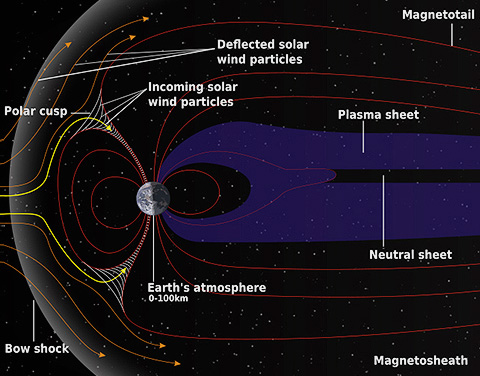
When the solar wind meets the earth’s magnetic field it causes various types of complex oscillations in the field that often are referred to as micropulsations and field line resonances.
Based on their waveforms, magnetic pulsations and field line resonances have been classified as pulsations that are continuous (Pc) and pulsations that are irregular (Pi). Because their frequencies are so low, they are usually characterized by their period of oscillation rather than frequency.
There are a variety of mechanisms that produce these oscillations, such as interactions of solar wind and the earth’s main magnetic field lines; sudden solar wind pressure changes that move/push the field in or allow it to expand out; and sudden changes in solar wind direction that cause the magnetotail to stretch and snap back. The figure below shows an example of these field line resonances, recorded at the GCI magnetometer site in Boulder Creek, CalifCA.
Important note: The frequencies of these field line resonances are in the same range as many of the rhythms found in human and animal cardiovascular and autonomic nervous-system functions.
In the Boulder Creek site example, there is a clear frequency at 0.1 hertz, which is the same frequency as the heart rhythm of someone who is in a heart-coherent state. Research has shown that changes in these ultralow frequencies (ULF’s, also called Pc and Pi), caused by solar activity and changes in geomagnetic activity can affect human health and behavior.
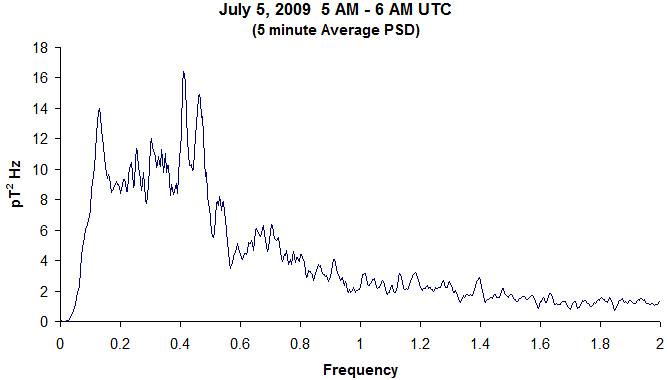
Geomagnetic field line resonance data recorded from the GCI sensor site in Boulder Creek, CalifCA.
Note that all the resonant frequencies overlap human autonomic and cardiovascular system frequencies. In this example, there is a clear standing wave frequency at 0.1 hertz, which is the same frequency of our heart rhythms when we are in a coherent state.
Schumann Resonances
Schumann resonances are global electromagnetic resonances in the cavity formed between the earth’s surface and the ionosphere. Schumann resonances were named after German physicist Winfried Schumann, who first predicted them in 1952. Electromagnetic impulses like those from global lightning flashes (Earth’s thunderstorm activity) fill this cavity and excite the Schumann resonances. The first accurate measurements of the Schumann resonances were made from 1960 to 1963 and since then there has been an increasing interest in them across a wide variety of fields.
Radiation from the sun ionizes part of the earth’s upper atmosphere and forms a conductive plasma layer, the ionosphere. The ionosphere surrounding our planet is negatively charged relative to the earth’s surface, which creates a strong electrical field between the earth and ionosphere. Schumann resonances occur because the space between the surface of the earth and the conductive ionosphere acts as a closed waveguide. This waveguide acts as a resonant cavity for electromagnetic waves. Schumann resonances appear as distinct peaks at extremely low frequencies starting around 7.8 hertz, which is considered the fundamental frequency.
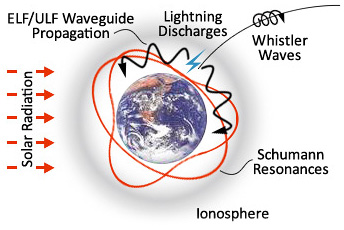
Schumann resonances in Earth-ionosphere cavity. Courtesy NASA.
Resonances can be observed at around 7.8, 14, 20, 26, 33, 39 and 45 hertz, with a daily variation of about ± 0.5 hertz, which is caused by the daily increase and decrease in the ionization of the ionosphere due to UV radiation from the sun (also see the live data).
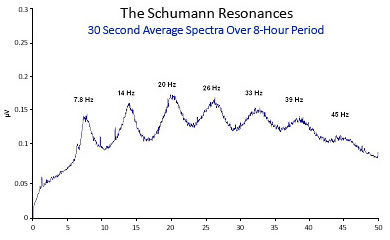
The signals recorded from the GCMS Boulder Creek magnetometers are converted to the frequency domain with the Fourier transform. The Schumann resonances occurring over an eight-hour period can be clearly seen at approximately 7.8, 14, 20, 26, 33, 39, and 45 hertz.
Interest in the Schumann resonances has gone beyond the boundaries of geophysics, into medicine, where it has posed questions about the interactions between planetary rhythms and human health and behavior.
(For more detail see the July 7, 2009 Commentary).
The similarity of the 7.8-hertz Earth resonance and human brainwave rhythms was quickly identified after the Schumann resonances were first measured, and early studies were able to demonstrate a correlation between these resonances and brain rhythms. Numerous studies conducted by the Halberg Chronobiology Center at the University of Minnesota along with other studies have since shown that there are important links between solar, Schumann and geomagnetic field line resonances and a wide range of human and animal health and wellness indicators.
Although the existence of the Schumann resonances is an established scientific fact, how these important planetary electromagnetic standing waves act as a background frequency that can influence biological systems such as the heart and brain is not completely understood.
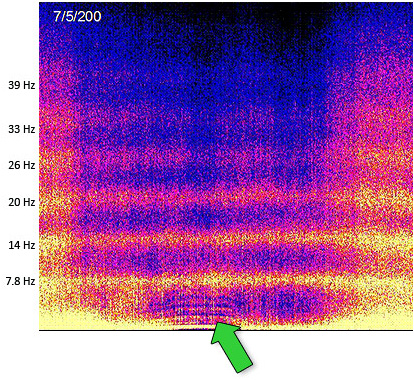
The green arrow in this spectrogram indicates continuous pulsations as well as the Schumann resonances. The data was collected by the magnetometer at GCI’s Boulder Creek, Calif.CA, headquarters.
GCI hypothesizes that changes in the earth and ionosphere’s resonant frequencies can influence the function of the human autonomic nervous system and brain and cardiovascular systems. Until recently, it has not been feasible to test this hypothesis scientifically. This is because there is a lack of reliable, continuous measures of ionospheric and field line resonances data and an inability to do long-term monitoring of people’s physiological systems such as heart rate variability monitoring, which reflects autonomic nervous-system activity.
Want to listen to the earth’s resonances?
The three-minute audio is data collected from GCI’s magnetic sensor in Boulder Creek. The resonances have been shifted up in frequency to an audible range. They were recorded at nighttime during a period of relatively quiet ionospheric activity.
Interconnectivity of all Living Systems Through Earth’s Magnetic Field
As noted elsewhere in this article, researchers at the HeartMath Institute and GCI strongly suspect human health and behavior are influenced by solar and geomagnetic activity. In addition, GCI researchers hypothesize that the earth’s magnetic field is a carrier of biologically relevant information that connects all living systems.
Related to this, we have shown in laboratory research that the electromagnetic field generated by the heart of a person can be detected by nearby animals or the nervous systems of other people.
For example, research conducted in HMI’s laboratory has confirmed the hypothesis that when an individual is in a state of heart coherence, the heart radiates a more coherent electromagnetic signal into the environment. This research further has shown that when we are in this coherent state, we are more sensitive to detecting the information in the fields radiated by others The Energetic Heart: Bioelectromagnetic Interactions Within and Between People Scientific Monograph by Rollin McCraty, Ph.D..
Of all the organs, the heart generates the largest rhythmic electromagnetic field, one that is approximately 100 times stronger than the brain’s field. The heart’s field can be detected several feet from the body with sensitive magnetometers.
GCI researchers hypothesize that the earth’s magnetic field is a carrier of biologically relevant information that connects all living systems.
The heart’s magnetic field would be a plausible explanation for why we can "feel" or sense another person’s presence and emotional state independent of body language or other factors. HeartMath also has found that there is a direct relationship between the heart-rhythm patterns and the spectral information encoded in the frequency spectra of the magnetic field radiated by the heart.
Thus, we believe, information about a person’s emotional state is encoded in the heart’s magnetic field, which is communicated throughout the body and into the external environment.
A growing body of evidence suggests that an energetic field is formed among individuals in groups through which communication among all the group members occurs simultaneously. In other words, there is an actual "group field" that connects all the members Coherence: Bridging Personal, Social and Global Health paper.
One study demonstrated the effect of heart coherence in a group setting where people trained in maintaining states of heart coherence for several minutes could promote coherent states in untrained participants.
Also supporting the hypothesis that magnetic fields are carriers of biologically relevant information is a recent study that demonstrated epigenetic information related to DNA could be detected as electromagnetic signals in a highly diluted solution and this information can be transferred to and imprinted in pure water that has never been exposed to DNA, but only in the presence of a 7.8-hertz weak magnetic field. Furthermore, this information can lead to the re-creation of DNA when the appropriate basic constituents of DNA are present – but again, only if extremely low electromagnetic frequency fields of 7.8 hertz are present to carry the information.
The study’s authors also state that such a very low electromagnetic frequency field that stimulates DNA information transfer could come from natural sources such as Schuman resonances, which start at a frequency of 7.83 hertz.
Dr. Michael Persinger, a well-known neuroscientist, has conducted numerous studies examining the effects of magnetic fields with the same magnitude as the geomagnetic field on brain functions and information transfer. Not only has he shown that applying external fields similar to the Schuman resonances can induce altered states of consciousness, he also has suggested in a detailed theory that the space occupied by the geomagnetic field can store information related to brain activity and that this information can be accessed by all human brains.
Furthermore, Persinger also suggests that the earth’s magnetic field can act as a carrier of information between individuals and that information, rather than the intensity of the signal carrying it, is important for interaction with neural networks. The above findings help support part of GCI’s hypothesis that the earth’s magnetic field is a carrier of biologically relevant information.
HeartMath and GCI further submit that because humans have brain and heart frequencies overlapping the earth’s magnetic field resonances, they not only are receivers of biologically relevant information, but they also essentially create a feedback look with the earth’s magnetic field and thus feed information into the global field environment.
While it is not difficult to conceive that life forms existing within the earth’s magnetic field could be affected by modulations in this field, it is a more far-reaching proposition to suggest that the earth’s field connects all living systems and carries and distributes biologically relevant information. Nevertheless, GCI researchers hypothesize that when large numbers of humans respond to a global event with common emotional feeling, the collective response can affect the information distributed in the earth’s field. In cases where the event evokes negative responses, this can be thought of as a planetary stress wave (of information), and in cases where a positive wave is created, it could create a global coherence wave.

